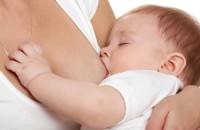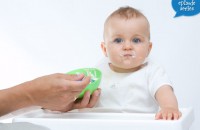The Boob Group
Breastfeeding Toddlers: Frequency, Biting, and Staying Motivated
[Music]
Robin Kaplan: Breastfeeding a toddler is drastically different from breastfeeding a newborn. Just ask any mother whose baby has teeth, can ask for the boob with words, and has the attention span of a small gnat. Today, I’m thrilled to introduce Andrea J. Blanco, a private practice International Board Certified Lactation Consultant in Miami, Florida with Loving Start Lactation Services. Today, we are discussing breastfeeding toddlers and managing that sometimes chaotic circus, this is The Boob Group, Episode 41.
[Intro]
Robin Kaplan: Welcome to The Boob Group, broadcasting from The Birth Education Center of San Diego. I’m your host Robin Kaplan, I’m also an International Board Certified Lactation Consultant, and owner of the San Diego Breastfeeding Center. At The Boob Group, we’re you’re online support group for all things related to breastfeeding. Did you know that we have an entire panel of experts who would love to answer your breastfeeding and parenting questions? All you have to do is call our hotline and leave a voicemail at (619) 866-4775 and leave a message. Your questions will then be answered on an upcoming episode. Today I’m joined by three lovely panelists. Ladies, will you please introduce yourselves?
Rachel Rainbolt: I am Rachel Rainbolt, thirty-eight years old. I am the author of The Sage Parenting Book, and I have three boys: ages seven, four, and one.
CM: I’m Christine McCarty, I have one nine-month-old daughter.
Rosario Rodriguez: Hello, my name is Miss Rosario Rodriguez. I am thirty years old, and I have a almost three year old and a three month old.
Robin Kaplan: Awesome, awesome. Who is currently nursing in the studio. Well ladies, welcome to the show!
[Music]
Robin Kaplan: Let’s kick off today’s episode with some unbelievable breastfeeding stories making headlines around the internet. All of the stories are posted on The Boob Group Pinterest Board if you want to check them out. So, the story I picked today was actually written by Jessica from The Leaky Boob, and her story was called “Fear and Breastfeeding in Las Vegas.” So, what happened was, I guess she was at a conference last week in Las Vegas at the Flamingo Hilton. She was asked for the first time ever if she would cover up while she was breastfeeding in a restaurant as she was surrounded by many, many ladies walking around with less clothing on than she had; and you can actually check out the photos that she showed on her article, on her website, but essentially, I’m going to show the ladies, our panelists-but there were women with pasties that were up all over Vegas.
The fortunate, actually, was that the Flamingo Hilton-she started Tweeting about it- and they actually met with her and were really, really nice about the whole thing and are thinking about bringing her back to do training for their employees-Ya, they stepped it up, a lot more than Hollister did-[Laughter] to talk about the laws and how women are allowed to breast feed in public.So, my question for you all is how as moms can we help to make it so that nursing in public becomes more of a reality? So that women will stop being harassed for nursing in public?
Rachel Rainbolt: I think that just breastfeeding in public ourselves, goes in leaps and bounds for normalizing it. I mean, if you go into a restaurant and there are two other moms nursing in there, you’re not going to feel the pressure and the stress, and the anxiety and the fear of breastfeeding your baby if they give you a cue that they’re hungry.
Robin Kaplan: Absolutely. How about you, Christine?
CM: I never even carry a nursing cover, just to encourage myself to nurse uncovered. And when I see another mom that’s nursing uncovered or covered, I just encourage her and I thank her for doing the best for her child and putting the work in.
Robin Kaplan: Awesome. Awesome. How about you, Rosario?
Rosario Rodriguez: The same thing, just trying to get rid of your fears and just doing it. You know, with a cover/without a cover. I know with my first, that I was really scared, and it was probably-like-I made more of a circus of myself, trying to do nursing cover and trying to latch her one and everything. [Laughter]And now with my second, I’m just like, “Here it is!” No I can do it more discreetly, and I try to do it as often as possible when I’m out to encourage other moms, like “Hey, it’s ok, don’t be scared. I’ll be friend, your advocate. You know, let’s do it together.”
Robin Kaplan: Very cool. One of my support groups, like a couple times a year- there’s a really cool restaurant that’s near where we have our support group and their super family-friendly. It’s actually like a family-friendly burger bar. And so, a couple of times a year we give them a call and say “Hey, we’re going to come on over, there are going to be like twenty nursing moms coming over,” and they’re super awesome about it. But we use it as a way for moms who are just learning how to nurse in public, they are surrounded by a whole ton of other moms who are doing it.”
Rachel Rainbolt: That’s very cool.
CM: That’s a neat idea.
Robin Kaplan: I know! I love it. It’s super fun that they get to do that with each other. And then the moms that are used to it can provide guidance, and the moms who have never really done it or are fearful, they’re surrounded by the tribe. So, it’s getting really cool. Alright, well thank you for sharing your advice, I love it. And we’ll be right back!
[Music]
Robin Kaplan: Ok, so today on The Boob Group we’re discussing breastfeeding toddlers, managing the sometimes chaotic circus. Our expert, Andrea Blanco, is a private practice International Board Certified Lactation Consultant in Miami, Florida with Loving Start Lactation Services. I first met Andrea when she decided to be a guest writer for my blog at the San Diego Breastfeeding Center. So her toddler articles have been some of the most popular articles on my site due to breastfeeding knowledge and her sassy storytelling. So, thanks so much for joining us Andrea, and welcome to the show!
Andrea Blanco: Thanks for having me, Robin! Welcome girls!
Robin Kaplan: So, Andrea, in anticipation of this episode, I posted on our Boob Group Facebook page and our San Diego Breastfeeding Center Facebook page, if anyone had questions about nursing a toddler-and we had over twenty questions and counting. Clearly it is quite a hot topic. So I just wanted to put it out there that I feel we’re going to have to expand this into a two part episode-and so I hope that you enjoy it and you want to come back.
Andrea Blanco: I’m excited.
Robin Kaplan: Cool, so before we get into all of those questions, I wanted to cover a few of the basics. So, Andrea, what is the average age of weaning around the world? How long are women breastfeeding for, in both developing countries as well as industrialized ones?
Andrea Blanco: The average age of weaning is actually very hard to pin down. Do we include babies who were never breast fed? Those were unable to breast feed for more than a few days or weeks dues to difficulties? Focusing on what the natural age of weaning is better at narrowing down what a child will do when left to wean on his own. Kathryn Detweiler (sp), who’s a leading anthropologist on the duration of breastfeeding in humans, has done wonderful work in this area, and she describes the natural age of weaning to be anywhere between two and half years to seven years old.
Robin Kaplan: Wow. Wow, ok. And what does nursing a toddler really look like in terms of frequency, and length of feeding, and how much breast milk does a toddler really need?
Andrea Blanco: I used to jokingly say that I still nursed my toddlers “on demand,” but “on demand” for a newborn and “on demand” for a toddler usually look like two very different things.
Robin Kaplan: Totally.
Andrea Blanco: Toddlers nurse for a lot of different reasons, and nutrition isn’t usually the main component anymore, so moms can be more flexible with what that means for them. Toddler nursing varies from one or two times a day when they’re busy and entertained, to little pit stops throughout the day. Plus morning, nap, and night-when they’re feeling vulnerable or even sometimes bored.
Robin Kaplan: Yes, that makes a- I love that because- toddlers’ demand at certain times of the day that may be actually not when they’re famished, but they just need is as, like you said, a pit stop. I love that. Ladies, what does your breastfeeding relationship look like with your toddler and how often is your toddler nursing at this point? Rosario?
Rosario Rodriguez: My toddler only really nurses on evenings and weekends because I work, but it’s really only about six/seven times, and then kind of throughout the night still.
Robin Kaplan: Are they long feedings, would you say? Or like a little topper?
Rosario Rodriguez: Yeah, they’re more like little snacks here and there. You know, she goes and runs around, does her thing, and then is like “Oh, I think I’m a little hungry,” so she comes and snacks.
Robin Kaplan: Perfect. How about you, Rachel?
Rachel Rainbolt: Well, my one-year-old right now-he still doesn’t eat all that much food. I mean, we offer him every time we eat, he’s allowed to eat off of our plates. But, he still gets the bulk of his nutrition from breastfeeding, so I would say he breastfeeds a lot. Pretty much, kind of on the same schedule he did when he was little. He breastfeeds for hunger. But when I was breastfeeding my middle son, as he got older-he breast fed until he was almost four-and it was a lot of, kind of like what you described with the pit stops. But he would kind of fuel up on the connection and security and feeling full and safe. And then he would go off and explore for a long time and be really independent, and then come back and connect, and then kind of be fueled to be independent and on his own.
Robin Kaplan: Very cool. Andrea, what do you think are the main reasons, from your perspective, of why women continue to breastfeed into toddlerhood, even when-for example, in western society in the United States, we’re having a hard time with this-it’s not necessarily the norm in our society, and they keep going. What do you think?
Andrea Blanco: We lead such busy lives, Robin. Whether we’re the primary caregivers and stay at home taking care of our children, or whether we’re working outside the home, continuing to nurse past that first year maintains that connection that would be so easy to inadvertently let go of. Life gets in the way, and having those moments of re-connection are vital to us and as mothers, and definitely to our children. A continuation of nursing is a good way to have that happen.
Robin Kaplan: And, ladies, why did you choose to breastfeed beyond a year? And Christine, I’d love to know also why you are choosing to breastfeed beyond that first year? Was this your initial goal, or did you kind of surpass what it was initially? Rachel, how about you?
Rachel Rainbolt: Well, I had always kind of intended on allowing my child to tell me when he was ready to be done. And my one year old-I remember kind of thinking on the day of his first birthday-kind of joking with my husband like “I can’t even imagine thinking it’s so healthy and so beneficial and so wonderful today, but then tomorrow ‘no, it’s done’…”
Robin Kaplan: There’s no nutritional value. [Laughter]
Rachel Rainbolt: Right, it ends! I think he would just implode. So, we just kind of approached it-just kind of knowing that my kids would get to decide when they were ready just seemed healthy and right. And also, just as their first birthday came and went, it didn’t really make sense to all of the sudden stop. It didn’t feel any different.
Robin Kaplan: Yeah. How about you, Rosario? Were you planning on breastfeeding past year and what made you choose to?
Rosario Rodriguez: Before I had my daughter, I didn’t really have any thoughts about breastfeeding and I was kind of like, “Oh, I don’t know what I’m going to do breastfeeding.” Once I started breastfeeding her, I did set a goal for a year, and it actually cam by faster than I thought. And, you know, it was the same thing-after a year there’s still lots of benefits and I liked that personal connection that I had with my daughter. So I just kept until she was ready to also wean.
Robin Kaplan: Cool. How about you Christine? What’s kind of your reasoning for thinking that you want to breast feed for longer than a year?
CM: Well, my biggest thing is that I’m in the military, so I go on frequent deployments,-and why- why not? I mean, I want that connection with her. I’m going to be gone so often and for such long amounts of time; I’m mom and I want her to remember that I’m mom, and I want to come back and her to remember that I’m mom. Even though I go on a six month deployment, I would love to come back and her latch right on again and go nursing again, if that’s what she wanted.
Robin Kaplan: Absolutely, yeah. Very cool. Andrea, one of the questions that kept coming up on Facebook was what to do about the biting? And obviously, babies will kind of nibble down even before toddlerhood, but a bunch of the moms were asking how to deal with when a toddler bites, because sometimes I guess there’s more intention behind it maybe? And how-does this have to be the end of their nursing relationship?
Andrea Blanco: I tend to think that toddlers probably bite for the same reason that infants do. They’re still teething….
Robin Kaplan: Yes, that’s true.
Andrea Blanco: They might be having ear infections, or something might be bothering them-they’re off. A lot of times, I remember my toddlers used to bite me right when they were just drifting off to sleep but they were still nursing, as a way kind of just to clamp down. It usually happens at the end of feeds. And this is something consistent.
The good thing between an infant biting and the toddler biting is that toddlers understand you a lot better. When it becomes a game, when they really like a reaction that mom gave them, whether it was negative or positive, then they’re likely to continue. So discussing in toddler terms-and toddlers vary from twelve months to thirty-six months, so it really matters what age you’re dealing with- but talking to them and making them understand that that is not acceptable because it hurts, would probably be the best way to deal with it. And just being consistent, I don’t think that they really do mean to bite unless somehow they’ve found that it’s a game between mom and baby, or mom and toddler.
Robin Kaplan: Yeah. You hear a lot about when babies bite and the mom shrieks out of this-surprise is the reaction-a lot of babies will giggle. And it you know, it’s just like, this is kind of fun, it’s this game. But yeah, I guess the nice thing is when there’s a toddler involved, you might actually be able to have a conversation about it.
Andrea Blanco: You absolutely can.
Robin Kaplan: Ladies, have you had to deal with biting at all? Rachel?
Rachel Rainbolt: Yeah, I think one thing about biting with a toddler is that there also, uh, sometimes they can be given other cups throughout the day that’s ok for them to bite on. So I think that that’s confusing for little one; to have a sippie cup with the little spout on it that they can chew on while they’re teething and then they’re nursing and they’re chewing on that, too. That can get really confusing. But for mine, whenever he did I would-you kind of have the instinct to pull them back, but that hurts a lot worse-so I would push his face in so that it would sort of force him to let go. And then I would put him down, and say “Ouch! That hurts Mommy. That’s ouchy now. It hurts, it needs to get better.” And so, if he did it, he couldn’t have that side again right away-so if he wanted to nurse, he couldn’t bite.
Robin Kaplan: Yeah. How about you, Rosario? Have you dealt with biting?
Rosario Rodriguez: Oh yes, I remember the very first time that she bit me, I shrieked and I yelled really loudly-and actually that scared her. So she started crying, and we were both like “Ouch!” So I thought, “I’m not going to have any emotion, positive or negative, because either she’ll get scared or then she’ll think that it’s a game.” So I just kind of kept composed and then I would do the same thing: just pull her off and say “Ouch, it hurts. Ouchy!” and just keep her off of it. And that seemed to work. I mean, it takes a couple of tries, and they kind of still test you. But if you’re consistent then it goes away and it goes back to normal.
Robin Kaplan: Perfect.
Andrea Blanco: What the first panelist discussed is also very real, and I call that “the toddler latch.” Once they start getting sippie cups a lot, they do tend to bite down a lot more because of the material that the sippie cup is….
Robin Kaplan: Ah, that’s a really good point.
Andrea Blanco: And I remember training my first, again-Ok, you have to open wide, stick your tongue out over your teeth like this when you latch- because it is very, very painful. But the good thing is that he was very good at mimicking what I was doing and latching on correctly once I told him what he needed to do.
Robin Kaplan: That’s so helpful to know, too, because obviously so many babies are getting cups after a year old. They’re getting water in it, or even juice, or things like that…
Rachel Rainbolt: We didn’t give him a sippie cup. We just gave him a cup with a straw or an open cup if he was drinking from one of our cups. But if he wanted to walk around, we’d give him a cup with a straw. It was enough so that as he toddled it wouldn’t spill, but it was so different from a real nipple that it wasn’t confusing.
Robin Kaplan: Well I think that-I mean I chew and all my straws. [Laughter]
Rachel Rainbolt: I know, and he is allowed to chew on the straw, but that was like, this is safe thing to chew on-this is a yes thing to chew on, this is a no thing to chew on-where the sippie cups can feel so similar to the breastfeeding that it can be confusing.
Robin Kaplan: Absolutely. Alright, well when we come back, Andrea will discuss dealing with a toddler who wants to nurse during every inopportune time, as well as dealing with strange looks and criticism for nursing a toddler.
[Music]
Robin Kaplan: And we’re back with Andrea J Blanco from Miami, Florida. Talking about nursing a toddler; and so Andrea, as you discussed in your articles on my Sand Diego Breastfeeding Center blog, toddlers can be very emotional creatures and often demanding. Can you imagine? So how do you recommend dealing with a toddler who wants to breastfeed when you don’t want to , and do you handle it differently at home then you do in public?
Andrea Blanco: I think that’s really up to the mom, as far as whether she wants to handle it differently. I think in public picking your battles might be the best way to go. I talked about the time that I was in church and my toddler started yelling “Boobie!” at the top of his lungs. [Laughter] That really happened. There I probably should have picked my battle and realized that I wasn’t going to get my way instead of causing a scene. [Laughter] However, when you’re home, obviously if this is not a good time for you, then that’s important for them to know. The same way that you require them to buckle up when they get in the car, there are rules in place. There can be rules in place with respect to nursing. I think it’s hard for moms to make that shift from one year of being at the baby’s beck and call to understanding that it’s ok to set limits, and then just being consistent with those limits, whatever that means for her and her baby.
Robin Kaplan: Yeah, that’s great advice. Ladies, how do you deal with the situation when you’re not necessarily in the mood to nurse your toddler, or you’re not in the right space to breastfeed your toddler? How about you, Rachel?
Rachel Rainbolt: I would try to anticipate times when I wasn’t super ecstatic/enthusiastic about breastfeeding and offer it to him before that, and then kind of prep him. For example, as he got older, for the second half of the night when I would nurse him all through the night, we would bed/chair. And then when I was tired, ready to get some deep sleep, I would say “Ok, night night Milkies. Milkies are going night night.” And then when the sun came up he could have them again. So I would kind of give him some prep ahead of time, and let him nurse as much as he wanted right before, and it was a lot easier to enforce that.
Robin Kaplan: Yeah. How about you, Rosario?
Rosario Rodriguez: Yeah, kind of the same thing. I would just, you know, let her know “OK. We’re going to go out. We can breastfeed right now, but when we’re out we’re going to be busy so let’s not do it.” And also, it was because of-sometimes just the criticism, or just like they start doing all kinds of weird motions when wanting to nurse.
Robin Kaplan: The acrobatics. [Laughter]
Rosario Rodriguez: Yes, the acrobatics. It’s just, like, really hard. And that usually worked.
Robin Kaplan: Did you just distract her with something else, for example, if she asked for it when you weren’t in the mood or ready?
Rosario Rodriguez: Yes, exactly. We did that. We’d be like, “Oh look, here’s a toy” or “Ok, I brought you some snacks!” You know her favorite-either Cheerios or little puffs or whatever she was into at the time. And that usually worked.
Robin Kaplan: That’s a nice thing about toddlers. Where it’s hard sometimes because they’re distractable, they can use you as a pit stop; but the other thing is that you can actually distract them away from something that you’re ready to do at that point.
Rachel Rainbolt: Well, they understand more practical things when they’re toddlers, too. So you’re like, “Well you could, but those rocks look really fun to jump on! [Laughter] If you want to jump on the rocks, we can’t drink milk, too. So let’s go jump on the rocks!”
Robin Kaplan: Absolutely. Andrea do you find that toddlers want to nurse more often when mom is at home just hanging out, and what tips do you have if the mom doesn’t feel like being a twenty-four hour drive-thru?
Andrea Blanco: I do think that toddlers tend to nurse more when they’re in a more familiar setting, simply because of that. I mean, I think the cool thing about toddlers is that they are ready to explore the world and to find their own independence, and that’s scary for them. That’s probably why they come back to home base and nurse so much in that little pit stop-like fashion. However, I remember the best advice I got when I was a mom and not a lactation consultant was “don’t sit down;” [Laughter] that’s probably not very practical when you’re at home and that’s what you want to do, but it really is very true. I mean, they’re used to, well mommy sits in this chair-and then mom probably uses a chair that’s comfortable for her, so that’s exactly where she wants to sit.
Distraction works wonderfully. There are some personalities that are not easily distracted, and you know-with anything- it’s just going to take a little bit more effort on mom’s part-and planning. I mean, what these moms said about having snacks ready or “look at the rocks,” and making something equally as exciting and more interesting, and knowing when. I mean, if your child just fell, there isn’t anything in the world that’s going to make them feel better than nursing at that moment, and that’s one of the huge benefits of nursing a toddler. But if you’re just lying around, and that’s not what you want to do for me it was just let’s get up really quickly. I would see the lurking hand coming and I’d jump up, “Ok, time to do something!” and run around. And that was enough, until the next ten minutes [Laughter] When I was approached again. But being out usually helps; I didn’t find that my children nursed as much when they were out unless it was, again, a familiar setting.
Robin Kaplan: Yeah, and you bring up a really good point. Because we’re talking about all these times a mom doesn’t want to nurse. But then on the flip side, I find that moms who nurse their toddlers have this superpower to calm their children in any situation. Andrea, did you feel like your boobs had super healing powers?
Andrea Blanco: Absolutely. I mean, we forget that breast milk has a natural analgesic property in it, and that does not change just because your child is not a baby anymore. It’s very real, and it’s an emotional comfort as well as a physical comfort that they’re getting when they’re coming to you. My kids are older now, they’re five and seven, and when they’re hurt usually they still come to lay on my chest, because it’s a source of comfort and a place of love for them-and that doesn’t change. So, I’m very very happy that I was able to nurse into toddlerhood, and it definitely worked for those moments when throwing themselves off the countertops didn’t really result in what they intended it to. [Laughs]
Robin Kaplan: [Laughs] As a mom of two boys, I totally hear you on that. And my kids are seven and six, so right around your boys’ age as well, and I didn’t nurse them into toddlerhood-but I do find, too, the minute they need to snuggle they just sit on my lap and just bury their head into my-my practically nonexistent-breasts. But for some reason-maybe it’s my heartbeat they’re hearing, I don’t know-but it is a really big sense of comfort. Ladies, how about you? Are you feeling like super healing powers/superhero boobies?
Rachel Rainbolt: Oh yeah. I mean it was awesome: I had the power to put him to sleep, to quiet him, to soothe him, to comfort him. I mean, I would bring him to business meetings and to when I would guest lecture in classes and things like that. And as long as I had my boobs, which I could never forget, he would have everything that he needed. It’s perfect, like if I’m on the phone and I need five more minutes of quiet, “There you go!”
Robin Kaplan: Oh my gosh, every mom can totally relate. The minute the phone rings they start beating each other up! That would….
Rachel Rainbolt: That solves the problem.
Robin Kaplan: Yes, exactly. That’s fantastic. How about you, Rosario?
Rosario Rodriguez: Yes, and you know, that’s exactly what I’m doing right now. So that the baby is not too noisy-I just stick the boob in there and now she’s off to sleep. But yeah, that’s how I was with my toddler as well. Very practical, like she said-you never forget them. We always had the quick snack or the fixer-upper for anything and everything that could go right or wrong.
Robin Kaplan: Absolutely. So ladies, what has been your favorite part of nursing your toddler? I guess Andrea, I’ll throw that out to you first. What’s your favorite part?
Andrea Blanco: My favorite part of nursing my toddlers was the conversations that we started to have at the breast. My oldest actually was the first one to alert me that I had hardly any milk, when I did not know that I was pregnant with his brother. And just a lot of really, really funny conversations that take place with respect to breastfeeding, that I don’t think would have ever, ever transpired otherwise. Like, my milk tastes like a mix between vanilla and chocolate ice cream I hear, [Laughter] and you know another thing I said-it’s just the time spent with them on me sometimes exasperating but I definitely cherish every minute of it.
Robin Kaplan: How about you, Rosario?
Rosario Rodriguez: That they latch on like a magnet. [Laughter] So you know, if they don’t have that-you know you said the sippie cup or things like that, you know, sometimes you don’t have- I did have a little bit of a problem with that with my daughter. But most of the time when their toddlers, you just like ‘bloop’ and it’s not-it’s just like super convenient and it’s awesome.
Robin Kaplan: That’s fantastic. How about you, Rachel?
Rachel Rainbolt: Probably just all of that, that fun bonding time. I mean, I can sing songs to him; his face is like six inches from my face. So without that I wouldn’t have all that face-to-face bonding time, I mean all those hours in a twenty-four hour period that he and I just get to know each other. And before I came I was taking his hand and touching all the parts on my face, and he would laugh and, you know, smile around the nipple. [Laughs]
Robin Kaplan: With it still in his mouth? [Laughter]
Rachel Rainbolt: Yes, yes, yes! [Laughter]
Robin Kaplan: Well clearly we couldn’t get to all of our Facebook questions, especially ones dealing with toddlers nursing to sleep and weaning a toddler. Andrea, is there any way that we can coax you into returning for a part two of this episode?
Andrea Blanco: Absolutely.
Robin Kaplan: Awesome. Well, thank you so much, Andrea, for your insight into nursing a toddler and for our Boob Group Club members, our conversation will continue after the show as Andrea discusses how to deal with those sometimes strange looks and comments regarding your toddler nursing. For more information about The Boob Group Club, please visit our website at theboobgroup.com.
[Music]
Robin Kaplan: So here’s a question from one of our listeners. This is from Renee Atkins and this is what she asked: “Have you noticed many mothers getting depressed after weaning? We hear a lot about depression in the first few months after having a baby, but since breastfeeding is protective of a woman’s mental health…If they stop weaning after eighteen months then get depressed, how do you advise them? Most practitioners would not say that it’s post-partum depression, but it is-it’s just delayed. Probably more common in women with a history of mood disorders-not much research on the subject, I’m not sure. I think mothers would appreciate knowing that this may happen.”
Veronica Tingzon: Hi listeners at The Boob Group. This is Veronica Tingzon, International Board Certified Lactation Consultant and owner of The Original Comfort Food Lactation Services in San Diego, California. Renee, what I’d like to answer is kind of going through the possibilities of what might be going on. You had mentioned in your question to us that this is kind of a delayed post-partum depression. Post-partum depression is defined as the period between six weeks and eighteen months post-delivery of your baby, and so this would not be considered post-partum depression. What, more than likely, it is is the mourning of that relationship-that bond that’s going on where you know, you get to cuddle your baby.
The other thing is that one of the hormones involved in breastfeeding is oxytocin, which is what lets the milk down, or gives you that milk ejection reflex. And oxytocin is commonly referred to as “the feel-good hormone” and what happens is, that as you start weaning, and you’re no longer getting that multi-daily release of the oxytocin, then you’re not getting that surge of those “feel good” hormones. So what you have is you have sleep deprivation still, because you have a child who is running you ragged sometimes. So the when you have that several doses of oxytocin a day to nothing, then you’re not getting that mood stabilized: you’re still feeling the effect of being tired from-most recently-being a family, it’s hard.
So, I think that that’s part of what’s going on, and it could be also that there’s a little bit of a clinical depression going on. I urge you to look up on Google maybe the work of Cynthia Good Mojab, or the work of Dr. Kathleen Kendall-Tackett-who are both in the field of lactational psychology, and do some great work with the research on this particular subject. I hope this helps, Renee. Good luck with your situation. I would so go and see a psychologist or psychiatrist so that you can help get those mood stabilizers going. Have a great day!
Robin Kaplan: Thank you so much to our experts, panelists, and all of our listeners. If you have any questions about today’s show, or the topics we discussed, call our Boob Group Hotline at (619) 866-4775 and we will answer your question on an upcoming episode. If you have a breastfeeding topic you’d like to suggest, we would love to hear it. Simply visit our website at newmommymedia.com, and send us an e-mail through the “Contact” link. Coming up next week, we have Wendy Wright, from Lactation Navigation, discussing you’re breastfeeding and pumping rights when you return back to work. Thanks for listening to The Boob Group, your judgment-free breastfeeding resource.
Disclaimer: The views and experiences shared by Christine in this episode are her own personal opinions, and not that of the United States Armed Forces.
[Exit Music/ New Mommy Media Disclaimer]











